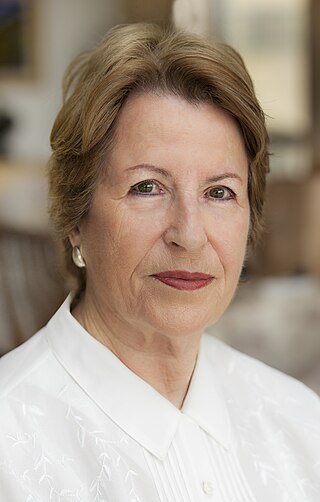
Ben-Gurion University of the Negev (BGU) is a public research university in Beersheba, Israel. Ben-Gurion University of the Negev has five campuses: the Marcus Family Campus, Beer Sheva; the David Bergmann Campus, Beer Sheva; the David Tuviyahu Campus, Beer Sheva; the Sede Boqer Campus, and Eilat Campus.

Maccabi Health Services, known as Kupat Holim Maccabi, is one of the four Health Maintenance Organizations (HMOs) currently active in Israel. It was founded in September 1940 and began operating in August 1941. Since 1995 Maccabi has been operating under the National Health Insurance Law. Membership fees for HMOs in Israel are legally determined and are collected from those entitled to membership by the Institute for National Insurance.

Ma'abarot were immigrant and refugee absorption camps established in Israel in the 1950s, constituting one of the largest public projects planned by the state to implement its sociospatial and housing policies.

Isaac Max Rubinow was a leading theorist on social insurance and one of the most influential writers on the subject. Rubinow had an M.D. from New York University Medical School and held a Ph.D. in economics from Columbia University. His 1913 book, Social Insurance, was the most influential early work on social security. His work impacted a generation of social reformers, including President Theodore Roosevelt, who used Rubinow's work in drafting the Progressive Party platform in 1912. The Progressive Party was the first of its kind to call for social insurance.

Anita Shapira is an Israeli historian. She is the founder of the Yitzhak Rabin Center, professor emerita of Jewish history at Tel Aviv University, and former head of the Weizmann Institute for the Study of Zionism at Tel Aviv University. She received the Israel Prize in 2008.

Soroka University Medical Center, a part of the Clalit Health Services Group, is the general hospital of Beersheba, Israel, it serves as the central hospital of the region and provides medical services to approximately one million residents of the South, from Kiryat Gat and Ashkelon to Eilat. Soroka has 1,173 hospital beds, and spread over 291 dunams in the center of Beer-Sheva.

The Ministry of Health is a ministry in the Israeli government, responsible for formulating health policies. The ministry plans, supervises, licenses, and coordinates the country's health care services. In addition to overseeing health services provided by Kupat Holim and family health centers such as Tipat Halav, the ministry maintains general hospitals, psychiatric hospitals, mental health clinics, treatment programs for substance abuse, and facilities for the chronically ill.

Clalit,, is the largest of Israel's four state-mandated health service organizations, charged with administering health care services and funding for its members.
The ringworm affair refers to circumstances involving an alleged number of 20,000 to 200,000 Jews who were treated between 1948 and 1960 for tinea capitis (ringworm) with ionizing radiation to the head and neck area within Israel. The population suffering from the disease in Israel at the time was composed primarily of newly-arrived immigrants and populations who were expected to emigrate, mostly from North Africa, as well as some from Middle East and elsewhere, but many Jewish children were irradiated in their home countries regardless of their intent to emigrate.

Healthcare in Israel is universal and participation in a medical insurance plan is compulsory. All Israeli residents are entitled to basic health care as a fundamental right. The Israeli healthcare system is based on the National Health Insurance Law of 1995, which mandates all citizens resident in the country to join one of four official health insurance organizations, known as Kupat Holim which are run as not-for-profit organizations and are prohibited by law from denying any Israeli resident membership. Israelis can increase their medical coverage and improve their options by purchasing private health insurance. In a survey of 48 countries in 2013, Israel's health system was ranked fourth in the world in terms of efficiency, and in 2014 it ranked seventh out of 51. In 2020, Israel's health system was ranked third most efficient in the world. In 2015, Israel was ranked sixth-healthiest country in the world by Bloomberg rankings and ranked eighth in terms of life expectancy.

Tuvia Friling is an Emeritus professor at Ben-Gurion University of the Negev, Israel. Previously he served as a senior researcher at the Ben-Gurion Research Institute for the Study of Israel and Zionism and a lecturer at the Israel Studies Program both at Ben-Gurion University of the Negev.

Yitzhak Kanev was a Zionist activist and politician. He was the founder of the Kupat Holim health care system and directed it for 38 years.

Ben-Zion Harel was an Israeli doctor and politician, who served as a member of the Knesset for the General Zionists between 1951 and 1959.

Kupat Holim Meuhedet, is Israel's third largest health insurance and medical services organization and is one of four state-mandated health funds that Israeli residents must belong to under Israel's universal healthcare framework.

Meir Medical Center is regional hospital in Kfar Saba, Israel. It is the seventh largest hospital complex in the country, and is part of a network of hospitals owned and operated by Clalit Health Services.
Shimon (Seymour) M. Glick is an American-born Israeli physician.

Shifra Baruchson-Arbib is a Full Professor in the Department of Information Science at Bar-Ilan University Israel, specializing in the history and sociology of media. She was the Head of the Information Science Department and has served as the Dean of the Faculty of Humanities at Bar- Ilan University (2015-2016). Her major achievements include her studies in the fields of the "History of Hebrew Books and Manuscripts" and of "Information Science", leading the Department of Information Science; and developing the academic field of Social Information Science.

Dvora Hacohen is an Israeli historian and professor in the Martin (Szusz) Department of Land of Israel Studies and Archaeology at the Bar-Ilan University in Israel. Her research interests are the development of Israeli society.
Varda Shalev is an Israeli medical researcher,a professor of medicine at the Tel Aviv University School of Public Health, and a primary care physician. She is also the co-founder and Chief Medical Officer of Alike. In 11.2022 she became a managing partner at Team8 foundry.
Nadav Davidovitch is a public health physician, epidemiologist and the chair of Israel's association of Public Health Physicians. He replaced Hagai Levine, in 2021, as interim director. Davidovitch has also served as chair of the Center for Health Policy Research in the Negev. Considered an infectious disease expert, he is also a member of Israel's “corona czar’s” advisory committee.
















